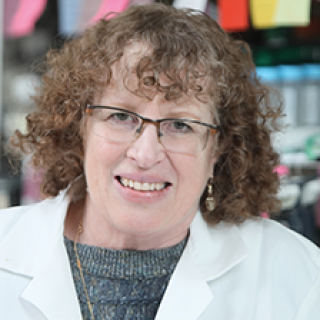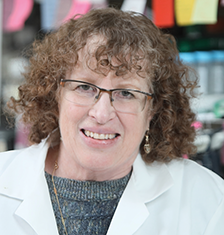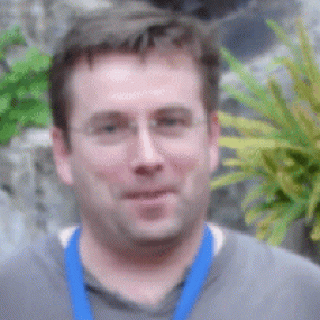
Mirit I. Aladjem, Ph.D.
- Center for Cancer Research
- National Cancer Institute
- Building 37, Room 5068D
- Bethesda, MD 20892-4255
- 240-760-7312
- 240-541-4475
- aladjemm@mail.nih.gov
RESEARCH SUMMARY
Dr. Aladjem studies cellular signaling pathways that regulate DNA synthesis. Since many regulatory pathways affecting chromosome duplication are deregulated in cancer, such studies can help understand cancer biology and elucidate the cellular response to chemotherapeutic drugs. Replication regulatory signals converge on replication origins, genomic regions that serve as replication starting points. Dr. Aladjem first reported that DNA sequence information can determine replication origin activity. Her team was the first to map replication origins on a whole genome scale, demonstrating a strong association between genome duplication and epigenetic modifications. Her current studies identify proteins that associate with replication origins to dictate if and when cells start or halt DNA synthesis. These studies will help decipher how normal and cancerous cells respond to signals that modulate genome duplication during chronological aging and after exposure to anti-cancer therapy.
Areas of Expertise

Mirit I. Aladjem, Ph.D.
Research
Research:
Understanding Cellular Networks Regulating Chromosome Duplication
Goal: Our broad goal is to understand the cellular networks that signal to and from chromatin to modulate chromosome duplication. The results of these studies can help elucidate how both normal and cancer cells control their growth and identify determinants of sensitivity to anti-tumor therapy.
The Challenge: Loss of genetic control of DNA replication is a hallmark of cancer, and pathways that regulate DNA synthesis are prime targets for synthetic lethality approaches for therapy that specifically target cancer cells. On the other hand, DNA replication problems can hamper genomic stability and promote cancer drug resistance. Hence, many anti-tumor drugs target protein complexes that are involved in DNA replication, and the effectiveness of such drugs critically depends on the nature of the genomic lesions affected in particular cancers.
Research Strategy: Replication origins, which initiate DNA synthesis in eukaryotic cells, are points of convergence for cellular signaling pathways. Replication initiation events proceed in a precise order and are strictly controlled by cell cycle checkpoints (Aladjem and Redon, Nature Reviews Genetics 2017; Thakur et al., Trends in Genetics 2022) that are often relaxed in cancer cells. In earlier studies, we identified replicator sequences, which facilitate DNA replication initiation (Aladjem, Science 1998), and used these replicators as baits to identify protein complexes that interact with replication origins and potentially regulate replication. Our recent studies use whole-genome sequencing, precise gene targeting and imaging-based single-fiber analyses to characterize the role of distinct proteins on genome duplication patterns. We currently address two main questions:
- How do cells maintain precise genome duplication? We identified replication origin binding proteins that play a role in regulating DNA synthesis, including the CRL4 ubiquitin ligase component RepID (Zhang, Nat Commun. 2016, Jang, Nat Commun. 2018), and the protein deacylase SIRT1 (Utani, Nucleic Acids Res. 2017; Thakur, Nucleic Acids Res. 2022):
- RepID recruits the ubiquitin ligase complex CRL4 to chromatin and is involved in a strong inhibitory interaction that ensures that each replication origin initiates replication only once during genome duplication, preventing excess DNA synthesis (Fu, Nat Commun. 2021). It also plays a separate, yet essential role for proper chromosome segregation during cell division (Jang, Nat Commun. 2020). Understanding how cells prevent excess replication is important, because excess DNA synthesis can be exploited therapeutically in cancer cells (Thakur, Trends Genet. 2022).
- SIRT1 is a nuclear protein deacylase that restricts replication initiation to a group of replication o origins (baseline origins) and inhibits replication initiation from dormant origins (Utani, Nucleic Acids Res. 2017; Thakur, Nucleic Acids Res. 2022). During unperturbed cell proliferation, dormant origins selectively bind phosphorylated RecQL4 (pRecQL4), which prevents the MTBP-TICRR/TRESLIN complex from binding, restricting replication initiation to baseline origins (Thakur, Nat Commun. 2025). SIRT1 activity decline (for example, as a consequence of chronological aging) exhibit excessive replication initiation and transcription-replication conflicts (R-loops; Thakur, Cells 2023).
- How do cancer cells overcome replication stress? Massive DNA damage can elicit a cellular checkpoint response that normally prevents cell proliferation, but highly aggressive cancer cells can tolerate widespread DNA damage. We reported a mechanism that allows cancer cells to respond to DSBs alongside continuous chromosome duplication, and identified molecular interactions that allow cells to activate novel replication origins when replication stalls or slows.
- MRDs, Mediators of replication and DSBs, help maintain genome stability by preventing DNA replication in damaged regions of the genome, specifically within topologically associating domains (TADs). Disruption of MRDs or TADs can lead to unwanted replication in damaged areas and increased DNA damage in cancer cells. MRDs include components like 53BP1, Rif1, the TIMELESS–TIPIN complex, and the WEE1 kinase, which stops replication near DNA breaks (Sebastian et al., Nature, 2025).
- Phosphorylated RecQL4, a RecQ helicase, facilitates the redistribution of MTBP-TICRR/TRESLIN to both baseline and dormant origins, aiding recovery from replication inhibition. Thus, the interactions between the MTBP-TICRR/TRESLIN complex and pRecQL4 at replication origins are critical for replication origin choice and facilitate recovery from replication stress (Thakur, Nature Commun. 2025).
Integration: Our insights into regulatory feedback networks that regulate cell growth are leveraged in collaborative translational studies within the NCI’s Developmental Therapeutics Branch (https://ccr.cancer.gov/developmental-therapeutics-branch), focused on the responses of cancers with distinct molecular characteristics to anti-tumor therapy.
References:
Aladjem MI, Rodewald LW, Kolman JL and Wahl GM. Genetic dissection of a mammalian replicator in the human beta-Globin locus. Science 281:1005-1009, 1998.
Aladjem MI, Redon CE. Order from clutter: selective interactions at mammalian replication origins. Nat Rev Genet. 18:101-116, 2017.
Fu H, Redon CE, Thakur BL, Utani K, Sebastian R, Jang SM, Gross JM, Mosavarpour S, Marks AB, Zhuang SZ, Lazar SB, Rao M, Mencer ST, Baris AM, Pongor LS, Aladjem MI. Dynamics of replication origin over-activation. Nat Commun. 12:3448. 2021.
Jang SM, Nathans JEF, Fu H, Redon CE, Jenkins LM, Thakur B, PongorLS, Baris AM, GrossJM, O’Neill M, IndigFE, Cappell S, Aladjem MI. The RepID-CRL4 ubiquitin ligase complex regulates metaphase to anaphase transition via BUB3 degradation. Nature Communications 11, 24. 2020.
Jang SM, Zhang Y, Utani K, Fu H, Redon CE, Marks AB, Smith OK, Redmond CJ, Baris AM, Tulchinsky DA, Aladjem MI. The replication initiation determinant protein (RepID) modulates replication by recruiting CUL4 to chromatin. Nat Commun. 9:2782, 2018.
Sebastian R, Sun EG, Fedkenheuer M, Fu H, Jung S, Thakur BL, Redon CE, Pegoraro G, Tran AD, Gross JM, Mosavarpour S, Kusi NA, Ray A, Dhall A, Pongor LS, Casellas R, Aladjem MI. Mechanism for local attenuation of DNA replication at double-strand breaks. Nature 639:1084-1092, 2025
Thakur BL, Ray A, Redon CE, Aladjem MI. Preventing excess replication origin activation to ensure genome stability. Trends Genet. 38:169-181. 2022.
Thakur BL, Baris AM, Fu H, Redon CE, Pongor LS, Mosavarpour S, Gross JM, Jang SM, Sebastian R, Utani K, Jenkins LM, Indig FE, Aladjem MI. Convergence of SIRT1 and ATR signaling to modulate replication origin dormancy. Nucleic Acids Res. 50:5111-5128. 2022.
Thakur BL, Redon CE, Fu H, Sebastian R, Kusi NA, Zhuang SZ, Pongor LS, Bohr VA and Aladjem MI. Selective interactions at pre-replication complexes categorize baseline and dormant origins. Nat Commun 16, 4140 (2025).
Utani K, Fu H, Jang SM, Marks AB, Smith OK, Zhang Y, Redon CE, Shimizu N, Aladjem MI. Phosphorylated SIRT1 associates with replication origins to prevent excess replication initiation and preserve genomic stability. Nucleic Acids Res. 45:7807-7824, 2017.
Zhang Y, Huang L, Fu H, Smith OK, Lin CM, Utani K, Rao M, Reinhold WC, Redon CE, Ryan M, Kim RG, You Y, Hanna H, Boisclair Y, Long Q, Aladjem MI. A Replicator-Specific Binding Protein Essential for Site-Specific Initiation of DNA Replication in Mammalian Cells. Nat Commun. 7:11748, 2016.
Publications
- Bibliography Link
- View Dr. Aladjem's PubMed Summary.
The replication initiation determinant protein (RepID) modulates replication by recruiting CUL4 to chromatin.
Dynamics of replication origin over-activation
Convergence of SIRT1 and ATR Signaling to Modulate Replication Origin Dormancy
Biography

Mirit I. Aladjem, Ph.D.
Dr. Aladjem received her Ph.D. from Tel Aviv University. She was a research associate at the Weizmann Institute of Science and then a postdoctoral fellow and a Leukemia Society Special Fellow at the Salk Institute in La Jolla, California. Dr. Aladjem joined the Laboratory of Molecular Pharmacology/Developmental Therapeutics Branch in October 1999 and was appointed a Senior Investigator in 2007. Dr. Aladjem's studies focus on cellular signaling pathways that modulate chromatin to regulate chromosome duplication and cell cycle progression. Dr. Aladjem co-chairs the NIH Cell Cycle Interest Group and the NCI’s Center of Excellence in Chromosome Biology.
Job Vacancies
We have no open positions in our group at this time, please check back later.
To see all available positions at CCR, take a look at our Careers page. You can also subscribe to receive CCR's latest job and training opportunities in your inbox.
Team
News
NIH Cell Cycle Interest Group Workshop
Wednesday, February 7, 2024, 10 am,
NIH Campus, Natcher building, Balconies A and B
Organized by: Munira Basrai, Mary Dasso and Mirit Aladjem
(Co-Chairs, NIH Cell Cycle Interest Group)
Agenda:
10:00 am: Keynote presentation:
Anja Katrin Bielinsky, PhD, University of Virginia School of Medicine
“Rescue missions during mitosis: Alternative end-joining and mitotic DNA synthesis”
11 am:
Vinutha Balachandra, PhD, (Basrai Lab) NIH FARE Award winner
“DNAJC9 prevents CENP-A mislocalization and chromosomal instability by maintaining H3-H4 supply”
11:25 am:
Hindol Gupta, PhD, (Kelly Lab) NIH FARE Award winner
“The Spatial Arrangement of Centromeric Chromatin Templates Kinetochore Architecture"
11:50 am:
Chongji Chen, PhD, Earle Stadtman tenure-track investigator
“Quantitative mapping of topoisomerase-modulated DNA supercoiling domains throughout the human genome”

